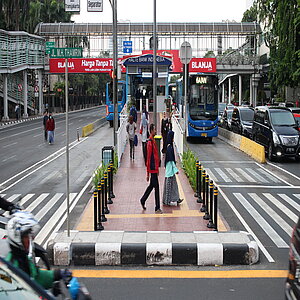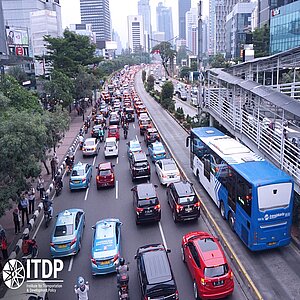Gender justice in urban planning

Interview with Deliani Poetriayu Siregar on urban planning, gender and social inclusion in Indonesia.
Climate change mitigation and biodiversity conservation projects are more successful, sustainable and equitable when specific gender justice measures are embedded in the targets and implementation. At the IKI Brown Bag Lunch in October 2022, three women shared experiences on this from their daily work. Deliani Poetriayu Siregar was one of them. She is the Senior Urban Planning, Gender and Social Inclusion Associate for the Institute for Transportation & Development Policy (ITDP) office in Indonesia. ITDP is focusing on reducing emissions through integration and optimisation of public transport in Indonesia in an IKI project.
How did you get to work this morning?
Every day I have to walk five minutes from my house to take an angkot from the street. An angkot is a microbus, which runs to serve the passengers from local roads to the main road. It may take me 10 to 20 minutes to get to Depok Baru station depending on the traffic, and then I finally take a train. I travel 45 minutes from Depok Baru station to Gondangdia Station. From Gondangdia Station I walk roughly 10 minutes to the office and finally I am in the office.
Can you give an example of how your work is fighting against climate change?
I really love to share stories about being a senior urban planning, gender, and social inclusion associate for ITDP Indonesia. I can ensure the gender mainstreaming perspective to mobility issues, and lawful recommendations can be implemented by the officials. For example, we can do the physical integration between KRL Jabodetabek and MRT Jakarta for seamless mobility. It is not only to ensure mobility but also follow-up journeys for one person, for women especially, to connect with the city centre. Jakarta, just like other cities in Indonesia, implements zoning planning. They always put the residential areas outside the city centre, and we must commute and spend more and more on transportation costs. The physical and fare integration that we assist is a really good thing that I can be proud of as part of the work.
What are the main gender differences in public transport in Jakarta or in the cities you are working in?
Studies and surveys conducted by ITDP Indonesia showed that women and men have very different movement patterns. It’s a continuous learning process to understand the differences in access and use of public space, infrastructure and transportation systems. In their daily routines, women access public transport facilities in the peak and off-peak hours. The city officials only want to serve the bus in peak hours. If the cities cannot provide safer and secure public transportation, it will limit women’s opportunities. Furthermore, for people living outside the city centre, sustainable or secure jobs and education are harder to access. It depends on the time and costs of public transport, which disadvantage people living outside the city centre to join the development.
How can public transport be changed to be more accessible for women or other marginalised groups?
Based on our experiences, discussions and collaborations with women and marginalised groups, fare integration is very fundamental. Without integration, marginalised groups must sacrifice by spending more time and money for public transport because they have different journeys and patterns of doing things in the city. Thus, if available public transport is not accessible for the marginalised groups, it will negatively impact opportunities and possibilities for accessing more options, including affordable transportation. For example, going home after 8 p.m. means I have to choose another option of transport considering the safety issues and availability of public transport outside Jakarta.
We also need to find a solution for the physical barrier – a universal design applied in all public transport stations. The urban sprawl should be mitigated with the integrated systems of transport. At this moment, Jakarta is the only city that has a quick and reliable transport system compared to other cities in the area. These circumstances mean more struggles for everyone who has to commute daily to Jakarta city.
Can you give one example of a structural challenge in public transport while fighting for gender equality?
Most women are not part of the discussions when it comes to planning, collecting data, issue mapping and so on. In city planning, women are neglected throughout the process. Making better infrastructure and planning the involvement of women is important, not only in issue mapping. Involve them in the planning and decision-making process, and let them choose the strategies that will be implemented. In most of our project phases, the gender proportion was not equal. There is an urge for more participation and direct collaboration. We should also talk more about the budget allocation to enable women to participate in the whole process.

What is the particular contribution of women and girls in the mobility transformation?
Through one of our IKI projects from 2018, we started working together with one of the kampung kotas (human settlements with suburban characteristics located in the city centre) in Jakarta. Women within this residential area proved that they can lead the transformation process and emphasise the needs of the pedestrian infrastructure and public realm. These kinds of transformations in development and mobility are initiated and led by them. Based on this, I believe that if we can engage with them more, provide the tools and talk more about the transformation, they can first address their needs in their neighbourhood and later the city.
What is the contribution of men?
In all activities, we invited men’s participation as well. Their role is to listen, understand and accommodate the plans. We usually try to have a 50-50 gender ratio for every forum, where we have an open discussion about the reasons for disadvantages or opportunities impacted by certain issues, activities and/or policies. This is good because they will participate and accommodate the sustainable transformation. They can also emphasise the needs of their wives or children.
How can we empower women and marginalised people in the context of persistent gender inequality in IKI Projects?
What we have learned so far from IKI projects is how to assist the officials. We have the chance to develop tools and methods to engage with women, girls and other vulnerable groups. With those developed tools and methods, they learn how to collect data for specific topics to be discussed in the forum and how to deliver their findings or points of discussion to the officials. Throughout all the IKI projects, we try to bridge these groups with officials, having the chance to develop a dialogue or a discussion. Enabling the women groups to understand the tools, methods and the process, we believe that it may benefit them so that they do not have to rely on anybody else to speak up more about their neighbourhoods and mobility. It is a good way to empower them directly.
[The interview was conducted by Kim Naser, Project Manager of the International Climate Initiative at Zukunft-Umwelt-Gesellschaft gGmbh.]
The link has been copied to the clipboard
Contact
IKI Office
Zukunft – Umwelt – Gesellschaft (ZUG) gGmbH
Stresemannstraße 69-71
10963 Berlin







